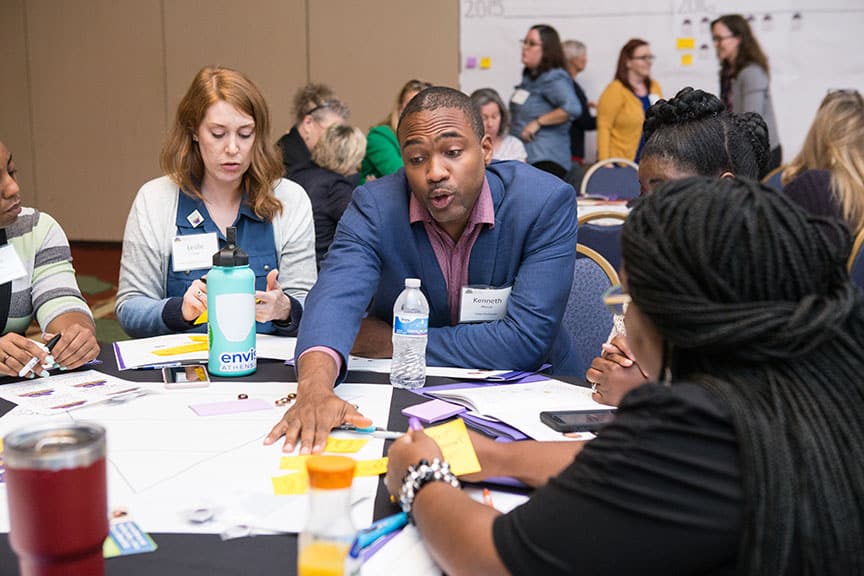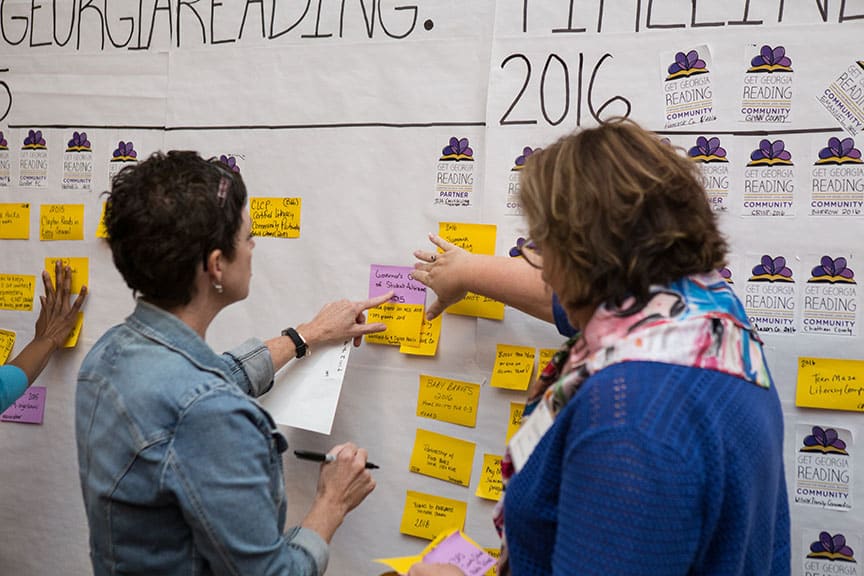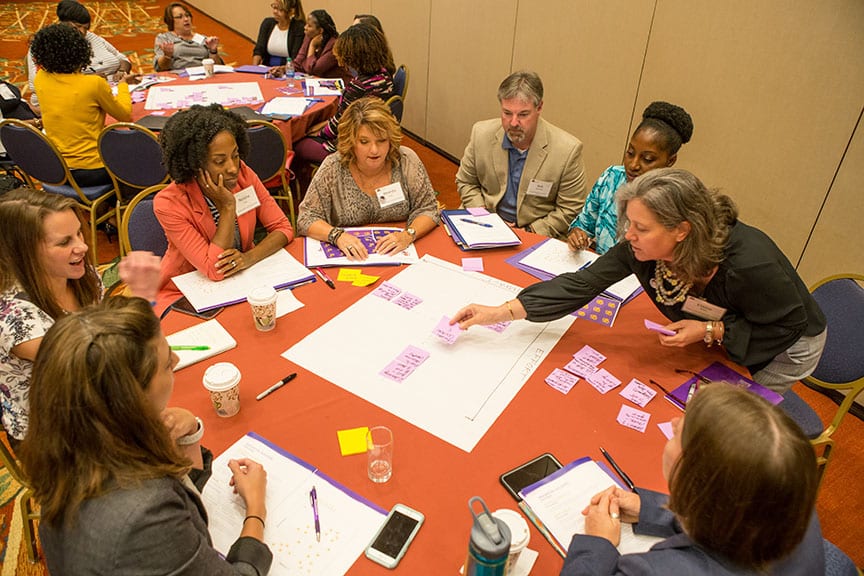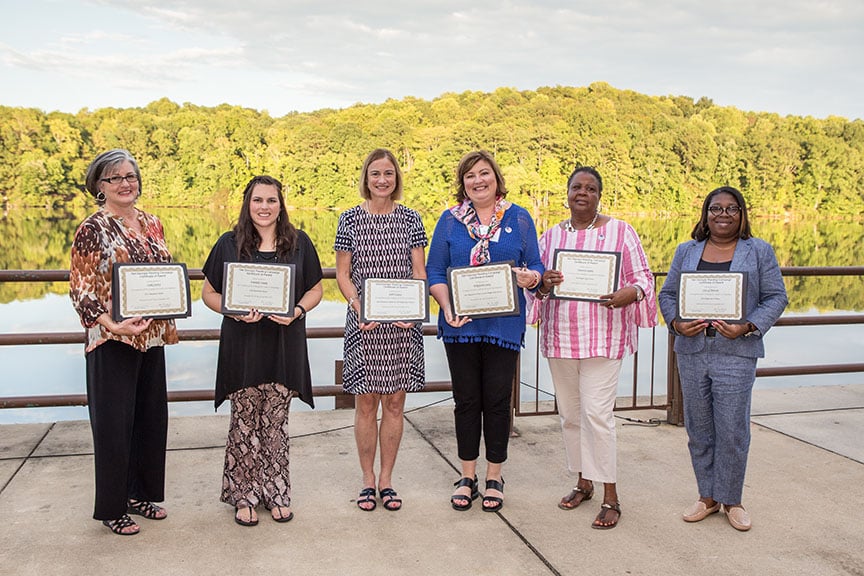Get Georgia Reading Campaign Envisions Pathway Beyond 2020

By Krystin Dean
The Beyond 2020 Get Georgia Reading Summit brought together a unique cross-section of community leaders and statewide decision-makers to stimulate innovative, scalable solutions that will create the conditions essential for all children to become proficient readers by the end of third grade.
“We made up our minds in 2013 to rewrite the story of Georgia’s approach to language and literacy,” said Get Georgia Reading Campaign Director Arianne Weldon. “And though we already know our story’s climax—every child in Georgia is on the path to literacy—we must remain vigilant and continue to learn from and inspire one another as we take the Campaign beyond 2020.”
The Get Georgia Reading network, supported by Georgia Family Connection’s statewide network, has more Campaign communities than any other state in the National Grade-Level Reading Campaign. From 2015 to 2019, Georgia’s network has grown from 40 to 100 Campaign communities representing 94 counties.
The percentage of all third-grade students achieving proficient learner or above on third-grade Milestones English Language Arts (ELA) has risen from 37 percent in 2015 to 42 percent in 2019.
Analyses of third-grade reading scores and high school graduation rates of 98,000 Georgians found that reading proficiency translated into a 30-percent higher graduation rate. The results were consistent regardless of race and ethnicity, gender, poverty, English-learner status, or disability status—making early reading proficiency the great equalizer.

Public and private investors from 2015 to 2019 contributed $92,401,930 in executing the Campaign’s four pillars—Language Nutrition, Access, Positive Learning Climate, and Teacher Preparation and Effectiveness. Approximately 60 percent of that supports L4GA (Literacy for Learning, Living, and Leading) communities, along with another $10 million per year in additional pillar investment.
“Our four-pillar framework is now adopted and embedded,” said Get Georgia Reading Campaign Director Arianne Weldon. “Cabinet members and partners have integrated the four pillars into strategic plans, proposals, and funding opportunities. With these four pillars as our guide, we’ve crafted unexpected solutions and transformed how systems operate with work that’s actually changed statewide systems and policies.”

The Campaign’s strategy is constantly being refined, using data and research to inform decisions. Partners have made significant strides to advance the four pillars including:
- integrating Language Nutrition coaching as a practice among workforces that already reach nearly every parent and baby—including nursing, child care, public health, and child welfare—through Talk With Me Baby;
- working with juvenile justice partners to address the two-thirds of youth in the juvenile justice system who have significant language skill deficits;
- increasing access to learning and nutrition in the summer months through the “Lunch at the Library” program, which reaches thousands of children at more than 100 libraries;
- ensuring that affordable housing developers are being incentivized to build properties that address barriers to education attainment, such as on-site early learning centers, proximity to schools that are beating the odds, and partnerships with local technical colleges to support adult literacy and workforce development;
- designing an approach to strengthen classroom climate by applying developmentally appropriate practices that support children as they transition from the early years through the early grades;
- passing HB 740, which prohibits students in preschool through third grade from being suspended from school for more than five days without first receiving a multi-tiered system of supports; and
- supporting research-based professional learning for organizations working with children from birth through age 8 at the Sandra Dunagan Deal Center for Early Language and Literacy founded in 2017.
During the summit, experts in this work shared research and data to frame issues before describing strategies and activities that put those insights into action. Attendees were encouraged to reimagine and redesign responses to prominent and persistent issues, and to identify actions in a framework that considers investment of time, impact, and effort.

Ron Fairchild, director of the Grade-Level Reading Support Center for the National Campaign for Grade-Level Reading, recognized several Georgia communities who received Pacesetter Honors or were named Bright Spots, along with county and statewide leaders who joined the Grade-Level Reading Council of Champions.
“We want to lift up and amplify the work that’s being done here in Georgia,” said Fairchild. “Gone are the days when we can only look to our own counties for ideas, resources, and support. We have to help good ideas go viral.”
